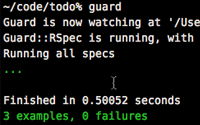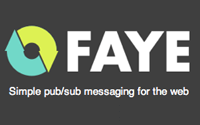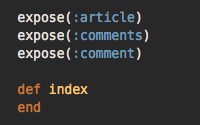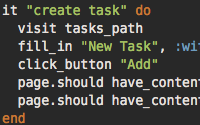Types
- Free Episodes
- Pro Episodes
- Revised Episodes
Categories
- Active Record
- Active Resource
- Active Support
- Administration
- Ajax
- APIs
- Authentication
- Authorization
- Background Jobs
- Caching
- Code Walkthrough
- Controllers
- Debugging
- Deployment
- eCommerce
- Forms
- Mailing
- Models
- Performance
- Plugins
- Production
- Rack
- Rails 2.0
- Rails 2.1
- Rails 2.2
- Rails 2.3
- Rails 3.0
- Rails 3.1
- Rails 3.2
- Rails 4.0
- Refactoring
- Routing
- Search
- Security
- Testing
- Tools
- Views
Applied Filters:
Free Episodes x
HTTP Streaming
HTTP Streaming allows the browser to start processing the HTML response while the Rails app is still processing the rest of the request.
(9 minutes)
Rails 3.1 Overview
This is the first episode in a series covering Rails 3.1. Here I show how to install the beta and show some of the new features.
(13 minutes)
Guard
Guard watches files and runs a command after a file is modified. This allows you to automatically run tests in the background, restart your development server, reload the browser, and more.
(8 minutes)
Client Side Validations
Showing validation errors inline as the user is filling out the form can lead to a better use experience. Learn how to do this using the Client Side Validations gem.
(8 minutes)
Trees with Ancestry
The Ancestry gem works like a tree but also allows us to fetch deeply nested messages in a single query. It provides a method to arrange them after fetching.
(9 minutes)
Testing JavaScript with Jasmine
Are you testing your JavaScript? Learn how to add specs using Jasmine. This episode also covers jQuery integration with jasmine-jquery.
(15 minutes)
Messaging with Faye
Faye is a subscription/publishing server which makes it easy to do push notifications within a Rails app.
(13 minutes)
Decent Exposure
The decent_exposure gem makes it convenient to share controller data with the view through methods instead of instance variables.
(9 minutes)
Token Fields
With the jQuery Tokeninput plugin it is easy to add an autocompleting list of entries for a many-to-many association.
(11 minutes)
Request Specs and Capybara
Request specs in RSpec are a great way to ensure the entire application stack is working properly. Here I also show how to use capybara with integrated JavaScript testing using Selenium.
(13 minutes)










